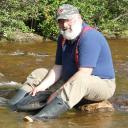Yahoo Answers is shutting down on May 4th, 2021 (Eastern Time) and beginning April 20th, 2021 (Eastern Time) the Yahoo Answers website will be in read-only mode. There will be no changes to other Yahoo properties or services, or your Yahoo account. You can find more information about the Yahoo Answers shutdown and how to download your data on this help page.
Trending News
What do Canadians call their equivalent of "the outback"?
Everyone knows that "the outback" refers to the thinly populated desert areas that make up the majority of the Australian continent. Well geographically, Canada is very similar: most of the population lives in the south-east and south-west. The further north you go, the further you get from civilisation. There are massive areas of the country, particularly the North-West Territories and Yukon that seem to be much like a cold version of Australia's outback. Is there a collective, colloquial term for these areas?
Hmmm... "territories" isn't really a colloquialism!
13 Answers
- Michael C...Lv 61 decade agoFavorite Answer
Yes it's .......The "United States of America"......(*lol*) sorry ,couldn't resist fellow Canadians (Michael C...)
- FrozenPondLv 71 decade ago
Probably in reference to the far north simply "the tundra"-which is land with few or no trees-mostly wide-open rocky terrain.The northern- most parts of the Territories,Quebec and Labrador fall into this definition.The Inuit(Eskimo) inhabitants say they are"going out on the land" when they leave their communities to hunt.
In more southerly parts there are various colloquialisms that very by region-where I live (in New Brunswick) going to the more remote areas is actually referred to by some as "going outback"-or to the "woods" or (out to the)"back country"..hence the term "outback" here.Some other people in other places use the term "going to the bush" or even "boonies".
- bbwfolkieLv 41 decade ago
I don't think we really have an equivalent term to "outback". "The North" is used to collectively refer to northern Quebec, northern Ontario, northern Manitoba, northern Saskatchewan and Alberta or we might refer to "the Territories" by which we mean Yukon, Nunavut and the Northwest Territories and it could be all three or any combination of them when we refer to the territories. I live in Northwestern Ontario and you might refer to going to the "bush" or living in the "bush" but that generally means going camping or having a home/cabin in any isolated area but it excludes all towns and settlements so it's not really the same use as "Outback".
Does that help at all?
- Karen LLv 71 decade ago
I'd call it the bush. We spent the summer in the bush. He's living out in the bush somewhere. If you go into the bush, be sure you take a compass. People also use "the toolies" sometimes, to indicate that something is away from civilization. We were way out in the toolies when the tire went flat. More officially, remote areas would probably be called wilderness areas.
- How do you think about the answers? You can sign in to vote the answer.
- Anonymous1 decade ago
Yes exactly you summed it up. Wow. Canada and Australia are probably the two countries in the world that have so much to compare that they should just combine into 1.
- capitalgentlemanLv 71 decade ago
Wilderness, or the bush. I live in the Yukon, and usually call it the bush. People can be "bushed" living out there too long (cabin fever).
- DoplerLv 71 decade ago
We don't really have a nice equivalent.
Take your pick:
The north
Up north
The arctic
Way up there
Northern Canada
etc.
Added:
I've never, ever heard the word "toolies" before...that one must be regional.





